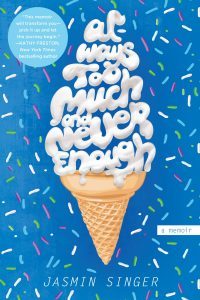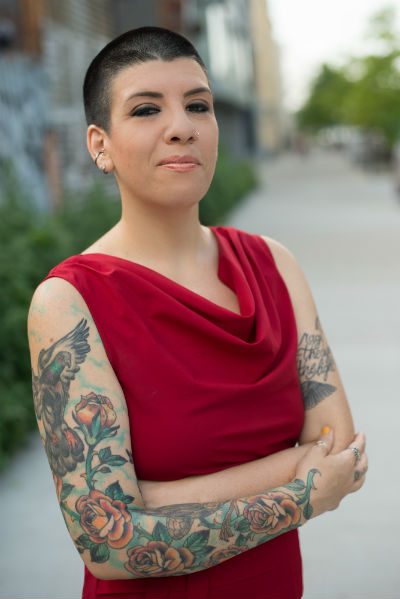Jasmin Singer’s journey from feeding her body to feeding her spirit produces a brilliant new memoir.
Vegan animal activist Jasmin Singer’s tell-all memoir about her struggle with food has been widely praised, and for good reason: it’s an honest, beautifully written account of her journey, and presents some naked truths that many queer women of any size or background can relate to.
We caught up with Singer to find out more about the impulses behind Always Too Much and Never Enough.
What prompted you to write this book, now?
I ended up writing this book because of a collision between my personal life and the politically charged discussion about “fatness” I saw in the media.
I had lost a lot of weight—nearly 100 pounds—when I wrote the original mindbodygreen article that sparked this book. At that time, I felt I had something to add to the conversation that nobody else was saying, since I had experienced the world as both a sometimes bullied, sometimes ignored fat person and then as a thin person who met society’s unbelievably demanding expectations about what size we should be. The contrast shocked me.
Always Too Much and Never Enough expands on that journey. It tells the story of my life as a fat kid who would run to food for comfort from the bullies. It then goes on to discuss my realization as an adult that I had been, and was still being, betrayed, not only by a culture that vehemently values thin over fat, but by our broken food system, which fails to nourish us, actually addicts us, and implicates us in its cruelty and destructiveness.
When the book opens, you’re 221 pounds and 5’4″, physically and emotionally in pain. How would you describe yourself now?
I feel grounded and healthy, and very much as if I’m living in a way that’s both true to myself now and open to the ways my truths will continue to show themselves. That’s not to say that everything is perfect, but when I think about where I’ve been, I feel extremely grateful these days, especially for the love that’s around me and inside me. For so long, I thought food was my great love, my best friend, my therapist, but when I was 30 and a doctor told me I was on my way to heart disease, I knew this destructive relationship had to end. As I found balance with what I ate and the reasons behind my eating, I also shed misconceptions of myself that had held me back.
I still sometimes slip into my more addictive behavior—vegan doughnuts, pints of coconut ice cream, and more than my share of cashew cheese all still sing a strong siren song. But I feel confident that when I slip, I can get myself back to a healthy mentality. For me, there’s some degree of struggle in that process, but I’ve recently begun to see some positives in struggle.
In the book, you go on a juice cleanse, the turning point for your 75-pound weight loss. Some fitness professionals discredit juice cleanses, uni-diets etc. Do you think what works for one person can be applied to others?
For me, switching from a diet of processed junk foods to a diet based on whole, unprocessed plant-based foods—along with regular, intermittent juice fasting—is what led to my massive weight loss, normalized my triglyceride levels, and helped lift my depression. As I say in the book, I don’t think that juice fasting necessarily works for everyone or is the right choice for everyone. But it worked for me.
My hope is that my story results in others living lives that are in harmony with their health and their ethical beliefs. Though you’re right that juicing is sometimes hotly contested, there is no question that leaning into, or fully embracing, a vegan diet based on fruits, veggies, legumes, whole grains, and high-quality fats, is healthy. And, for me, my vegan diet is so much more. It’s an extension of my worldview. My story is not only my journey toward health, but of how I learned to feel empowered by knowing I could vote for the rights of animals with my dollars and my fork.
My book doesn’t proselytize about veganism or about juicing. It’s a memoir. It tells my story. I think, and I hope, that my story will resonate and cause readers to question their longstanding beliefs about the world, and maybe about themselves, and help them find their personal truths.
You rationalized being overweight as a sign of “abundance,” also as an aspect of your unique identity (“Zaftig Vegan”). Do you think the body positivity movement does a similar thing? Or can being fat also be healthy, sexy, and empowering?
I can’t speak for others, but when I was fat I spent a lot of time and energy bouncing back and forth between rationalizing my bad relationship with food by shunning the mainstream negative view of fatness and secretly feeling shame about my eating and my body.
I find it thrilling and empowering whenever I see a woman of any shape or size celebrating herself and her body in a genuine way. I have no doubt that there are people in the body positivity movement who have peace and joy within themselves regarding their bodies. I imagine there are also those who sometimes struggle with self-acceptance. It’s something that we all contend with.
And it’s not all about size. I know plenty of persons of size who have a healthy attitude about eating and a healthy lifestyle, and plenty of thinner people who are off-center and express to me that they don’t feel grounded around food. (I think the caveat is that there is a point where weight reaches a level where it’s not possible to be physically healthy. I don’t really know where that point is, though.) But for me, the truth is I was a lifelong food addict, always turning to the kitchen cabinets for a quick fix and an escape from my woes. At the end of the day, it wasn’t about the number on the scale, but about finding peace within myself and taking control of my life.
 You nail the emotional relationship a lot of women have with food: one that is almost sexual, definitely private—but you note that food also betrays you. What is it about women needing to feel “full” and the presence or absence of love in our lives? And did your loving partner Mariann help you address your issues?
You nail the emotional relationship a lot of women have with food: one that is almost sexual, definitely private—but you note that food also betrays you. What is it about women needing to feel “full” and the presence or absence of love in our lives? And did your loving partner Mariann help you address your issues?
I’m so glad that you feel I captured the emotional relationship many of us have with food—that was something I really tried hard for. But that doesn’t mean I’ve necessarily figured out the relationship between needing to feel full and needing to feel love. Though I’m finally in a balanced place with my diet, I still struggle with how much my identity can be impacted by others—whether it’s because I’m being validated by those who love me, or invalidated by those who don’t. Is that human? Is that flawed? Probably both.
I’m not sure it’s true that I was ready to tackle my issues around “fullness” simply because I was with [my partner] Mariann when I began my weight loss journey, but it did help to be in a situation in which I felt safe and supported, with someone extraordinary who got me and got it. I’m realizing that even for those of us who, like me, are partnered with an amazingly brilliant and generous person, it’s ultimately up to us to find our own validation and fullness. I doubt that journey is a straight line for anyone.
You confirm that there is such a thing as thin privilege and you note that women, whether fat or thin, are judged by their external appearance and not by what’s inside. What can be done about this?
My guess is that the answer has to do with empathy and a willingness to make actual, concrete changes in our lives as a result of that empathy. I try really hard to live consciously, to understand the impacts my choices have on others, and to gain a full understanding of where I’m putting my money and my energy. And yet there are still so many times when it becomes apparent that something that I’m doing is not in line with my values, so I shift and I shift some more. I look forward to discovering the many ways I will continue to realign my life to my values so that I always find the right way forward for me.
Each of us has the potential to begin to see other individuals as they truly are, and not as stereotypes. And then we have to act. And that is how the world changes.
The 2013 NIH study estimated 75% of lesbians are obese, which has been contested. However, a good deal of lesbian socializing does happen around drinking and eating, and sometimes women express unhappiness with their bodies even as they “indulge.” How can we be supportive of each other’s bodily realities without policing and applying unreasonable or external standards to our bodies?
When I first began the process of coming out, a straight family member told me I was “making the wrong choice.” The year prior, when I was 18 and visiting the gynecologist for the first time, the doctor informed me that I weighed too much for a girl my height. My feet were in stirrups while she told me, her medical student beside her. In both instances, I was mortified and outraged, and wondered how someone could be so tactless and insensitive to my reality, to my experience, to my truth.
I tend to think we shouldn’t generally assume we know what is going on for the person in front of us, even if our concern comes from good intentions. If I had a fat friend who had never expressed an issue with her size, and yet I felt concern, or wondered if I had an obligation to “help her,” I would assume she knew who she was and what she needed. If you care about her, she will know it without you pointing out her size. And then, if she needs help, regardless of whatever issue she may be struggling with, she may come to you for it.
